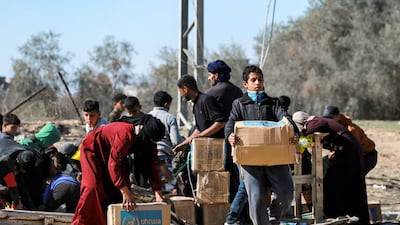In October Israel’s parliament, the Knesset, passed a controversial law banning all operations by UNRWA, the UN relief agency for Palestinians, in areas where Israeli law applies.
The ban comes into effect today – at the worst possible time for the 2.3 million residents of Gaza, as a ceasefire that halted a devastating 15-month war had presented UNRWA and other agencies with the opportunity to deliver them much-needed aid.
The impact of ending the provision of education, health care and other services in East Jerusalem and the occupied West Bank, as well as severely complicating the aid operation in Gaza, is certain to be profound and long-lasting. Such is the scope and scale of the organisation’s role in providing support to millions of Palestinians living as refugees inside the occupied territories, as well as in Jordan, Lebanon and Syria.
The agency’s origin story is essential to understanding how central, perhaps even ubiquitous, it has been to four generations of Palestinians. Established by the UN General Assembly in 1949, its mission was to carry out relief and development programmes – including providing food, health care and education – to the tens of thousands of Palestinians displaced by establishment of the State of Israel. The organisation has since grown, employing tens of thousands of Palestinian workers. In essence, it carries out the work of what a Palestinian state would provide its people.
Since the onset of Israel’s latest, and most destructive, war in Gaza, UNRWA says it has provided food for almost 2 million people, primary healthcare consultations to 1.6 million of them, and water to more than 600,000. It has also managed more than 100 emergency shelters and provided mental health support for 800,000 residents – all of this during a conflict that left more than 47,100 people dead and displaced more than 90 per cent of Gaza’s population.
UNRWA’s existence has served to remind the rest of the world of the Palestinian cause. Israel’s critics often say that this is in part why the country’s political class has long sought to undermine the agency’s work. Indeed, the ban follows previous, unsuccessful attempts by the Israeli government to have the organisation defunded, and even decommissioned.
After Hamas’s deadly attack on Israel on October 7, 2023, Israel alleged that several UNRWA staff members directly took part in the raids. A recent internal investigation by UNRWA did find a few of its several thousand Palestinian employees were involved, but the extent of participation was nowhere near the scale Israel claimed. People who committed crimes should be held responsible, but not an entire agency.
Nonetheless, the agency’s impending closure in Israel is bound to make an already terrible situation for the Palestinian people decidedly worse. Given the scale of Gaza’s devastation and increasing instability across the West Bank, a fully functional UNRWA is needed now more than ever. With its operations certain to be crippled, millions risk being further disempowered and impoverished. To an extent, it will also untether Israel from its moral responsibility for the dispossession of the Palestinian people that its forces – and the international community – oversaw from 1947 to 1949.
That same international community is watching from the sidelines, as Israel prepares to enforce its ban today. Having received support from the US, no amount of pressure from other countries is likely to deter it from going ahead with its plan. Yet the international community still has an imperative to act, and act quickly.
It needs to insist upon UNRWA’s right to continue its work and, failing that, should rally around the idea of building a temporary, alternative agency capable of filling some of the vacuum that the UNRWA ban will inevitably leave – at least until a viable path to nationhood can be found for the Palestinian people. The rest of the world has a moral responsibility of continuing to support them, particularly in their most desperate hour.


